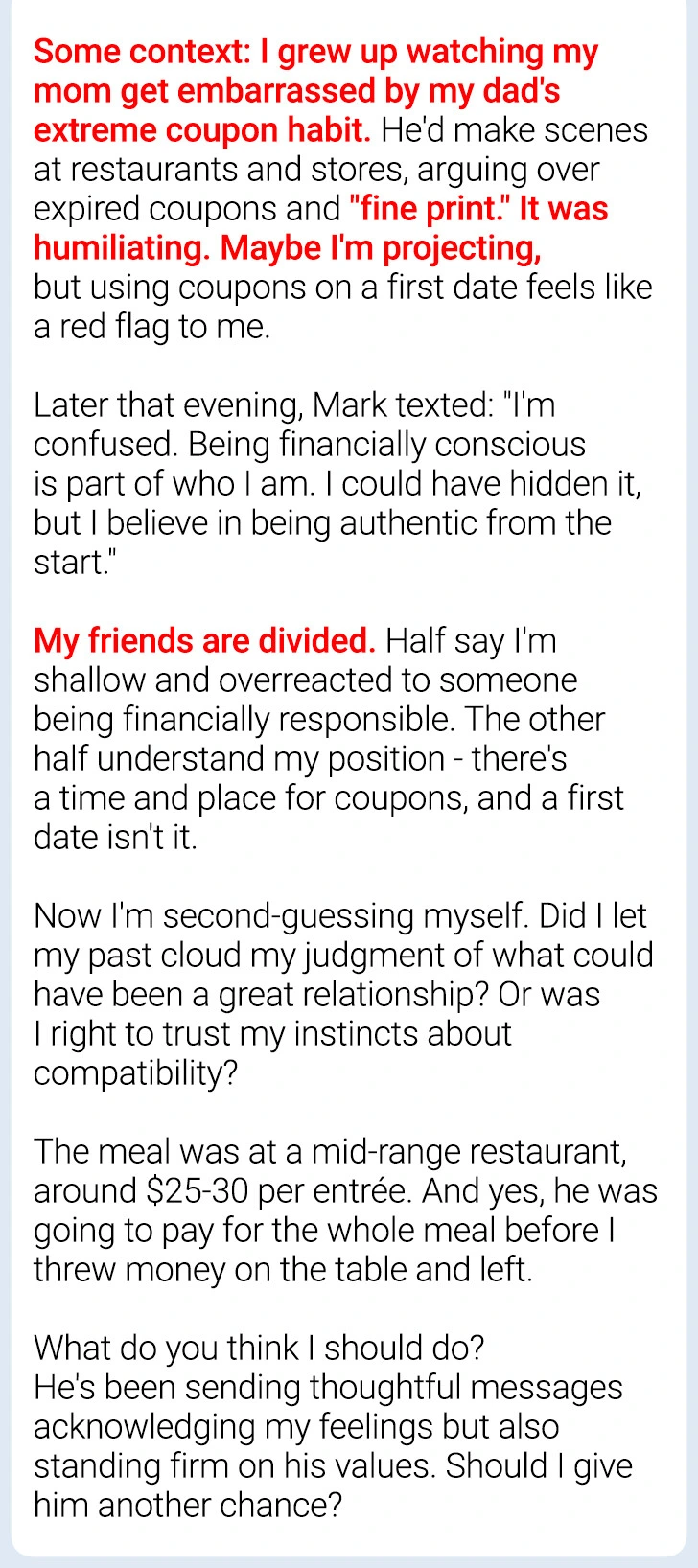Dating can be tricky terrain, full of surprises that challenge our expectations and beliefs. Dolly, a 27-year-old reader, recently shared her story of how one small act—a first-date coupon—sparked an unexpected emotional reaction and unearthed deeper questions about romance, financial values, and personal baggage.
Her story isn’t just about a coupon. It’s a reflection of how past experiences and societal pressures can shape our responses in relationships, often in ways we don’t immediately recognize.
Mark’s Coupon: A Bold Move or a Red Flag?

Imagine sitting across from someone charming, witty, and full of potential on a first date. Everything seems perfect until the check arrives, and your date casually pulls out a coupon. For Dolly, this was a jarring moment. It wasn’t about the money—Mark was willing to pay—it was about what the coupon symbolized to her.
For Dolly, that simple act brought back memories of her father’s extreme couponing, which she recalled as a source of tension and embarrassment for her family. Those emotions flooded back, transforming a seemingly innocuous gesture into something much bigger in her mind.
The Emotional Weight of Childhood Experiences
Our reactions are often shaped by our past, and Dolly’s experience is no exception. Her father’s obsessive couponing had left an indelible mark, coloring her perception of financial habits. While Mark’s actions were grounded in practicality, they triggered memories of her father’s behavior—scenes of public arguments and her mother’s discomfort.
Understanding the connection between these past experiences and her visceral reaction is crucial. It wasn’t just about Mark’s frugality; it was about what that frugality represented to Dolly—an echo of a childhood she wanted to avoid reliving.
Frugality vs. Cheapness: A Matter of Perspective

Was Mark’s use of a coupon really such a problem? For some, it might even be seen as a virtue. After all, financial responsibility is an increasingly valued trait in modern relationships. Mark wasn’t being cheap—he was being thoughtful about his spending, consistent with his career as a financial advisor.
The distinction between frugality and cheapness often lies in intent and execution. Mark wasn’t making a spectacle or shirking his responsibilities. He was simply demonstrating a core value: making smart financial choices.
Romance and Money: Shifting Modern Expectations

In a world where financial literacy is celebrated, the rules of dating are evolving. Gone are the days when first dates were about impressing someone with extravagant gestures. Today, authenticity often matters more.
Mark’s choice to use a coupon wasn’t about cutting corners; it was about being genuine. He chose to show Dolly who he really was, rather than pretending to be someone else. This honesty, while initially jarring for Dolly, might be a foundational trait for a meaningful relationship.
Societal Judgments and Their Influence
One key aspect of Dolly’s discomfort was her concern about how others in the restaurant might perceive the situation. This anxiety about external judgment is something many of us share. But is it worth letting those fleeting opinions influence how we see our potential partners?
Mark’s behavior didn’t actually warrant embarrassment—it was Dolly’s fear of how others might interpret it that escalated the situation. Releasing these societal expectations can open the door to deeper, more authentic connections.
Mark’s Follow-Up: A Sign of Maturity

What stands out in this story is how Mark handled Dolly’s reaction. Rather than becoming defensive, he addressed her feelings thoughtfully and respectfully. He acknowledged her discomfort while staying true to his values—a sign of emotional intelligence and maturity.
This response suggests a partner who’s willing to engage in difficult conversations, an essential quality for navigating life’s inevitable challenges.
Reflecting on Values and Compatibility
Ultimately, the real question isn’t about the coupon itself. It’s about whether Dolly and Mark can appreciate and align their differing approaches to money. Relationships thrive on mutual understanding, and this situation offers an opportunity for both to learn and grow.
Dolly’s reaction highlights the importance of reflecting on how past experiences shape our perceptions. By recognizing these influences, she can decide whether to let them dictate her choices or to approach relationships with fresh eyes.
A Lesson in Self-Awareness and Growth

This story isn’t just about Dolly and Mark—it’s about all of us. It’s a reminder that dating often challenges our assumptions and exposes our vulnerabilities. What matters is how we respond.
Mark’s willingness to be authentic, even at the risk of rejection, reveals a strength of character that shouldn’t be overlooked. Meanwhile, Dolly’s ability to question her own reaction shows a level of self-awareness that will serve her well in future relationships, whether with Mark or someone else.
Conclusion: A Second Chance or a Lesson Learned?
Dolly’s story is a testament to how the smallest moments can reveal the deepest truths about ourselves and our relationships. While the coupon may have sparked a clash, it also opened the door to important conversations about values, compatibility, and personal growth.
Whether she decides to give Mark another chance or move on, this experience offers a valuable lesson: relationships aren’t just about finding someone who fits our ideals—they’re about growing and learning together. Sometimes, the things that initially push us away can become the very qualities we value most.


